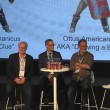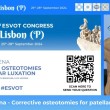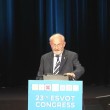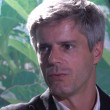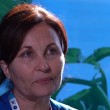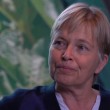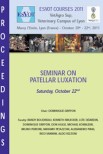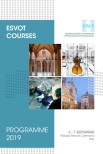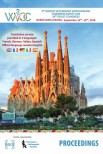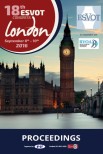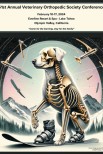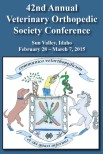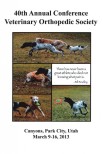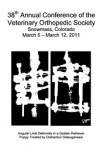Mark D. Markel, DVM, PhD
Vilas Distinguished Achievement Professor
Chair, Board of Trustees
ACVS Foundation
Chair, AORRC
AO Foundation
Chair, Department of Medical Sciences
Associate Dean for Advancement
School of Veterinary Medicine
University of Wisconsin
Introduction
Currently, I am the associate dean for advancement, Vilas Distinguished Achievement Professor, chair of the Department of Medical Sciences, and co-director of the Comparative Orthopaedic Research Laboratory at the School of Veterinary Medicine. I attended the University of California-Davis (UC Davis) for my undergraduate and professional degrees. I subsequently completed an internship in large animal medicine and surgery at the University of Pennsylvania and an equine surgery residency at UC Davis. Following my residency, I was accepted into a PhD program at the Mayo Graduate School of Medicine, completing my degree in 1990 with an emphasis in biomechanics. During my PhD, I passed the certification examination for the American College of Veterinary Surgeons (ACVS). Afterwards, I was recruited to the UW-Madison School of Veterinary Medicine as an assistant professor of large animal surgery and helped establish the Comparative Orthopaedic Research Laboratory.
In 1995, I was promoted to associate professor with tenure in the Department of Surgical Sciences. In late 1995, I was recruited and hired as chair of the Department of Medical Sciences. In 1998, I was promoted to professor of large animal surgery in the Department of Medical Sciences. In 2001, I was appointed to a newly created position, the associate dean for advancement at the UW-Madison School of Veterinary Medicine, to head fundraising, communications, and strategic planning for the School. In 2011, I was awarded a Vilas Distinguished Achievement Professorship by UW-Madison.
G.S-S. At what period in your education did you decide that you wanted to become a veterinarian and what were the influences that led to your decision?
M.M. I first decided to become a veterinarian in seventh grade when I was 11 or 12. We had a junior high school career fair and growing up in southern California, I was looking for a job where I could be outside, enjoying California’s temperate climate, while still doing something intellectually challenging. Of course, I’ve now lived in Madison, Wisconsin for the last 20 years and the temperate climate part of the equation hasn’t quite worked out. My interest in veterinary medicine was reaffirmed through my high school and university years as an athlete which further focused my interest in musculoskeletal injuries, particularly as they related to sports and the equine athlete.
G.S-S. During your veterinary education, did any particular individual have a special influence upon you at that time; an influence that had a paradigm effect on your future career?
M.M. I would say that the individuals who had the greatest impact on my career were Drs. John Pascoe at UC Davis and Dean Richardson at the University of Pennsylvania, both prominent equine surgeons whom I admire to this day. Dr. Gene Steffey, who was Chair of the Department of Surgery at the School of Veterinary Medicine at UC Davis during my residency, heavily influenced my academic pursuits. As I was completing my equine surgical residency at UC Davis, I planned on going into private practice in southern California and Dr. Steffey basically told me I should first complete a PhD prior to making any long term decisions with regard to my career path. This led me to pursue a PhD in physiology and biophysics with an emphasis in biomechanics at the Mayo Clinic in Rochester, Minnesota. My experience at Mayo led me into the field of comparative orthopaedics focusing on musculoskeletal injuries and their repair across many species including dogs, horses and humans.
G.S-S. Can you recall a patient that you treated and can now remember the difficulties involved and the outcome of your ministrations?
M.M. When I was an intern at the University of Pennsylvania, a Standardbred stallion came into the clinic with severe colitis who ultimately developed laminitis of all four feet and subsequent sloughing of all four hooves. Over the course of most of that year, my other intern-mates and I cared for the stallion, including attending him in the University of Pennsylvania’s recovery pool for 12 or more hours per day and then hoisting him into a heavily bedded stall for the remainder of each 24-hour period. As you can imagine, this was an extremely labor-intensive venture. Ultimately, the horse regrew all four of his hooves although parts of each of his distal phalanges on each foot had to be debrided due to infection. He later became a successful breeding stallion. This positive outcome of what typically would be a death sentence heavily influenced my understanding of what could be accomplished if veterinarians and support staff are dedicated to the healthcare of sick or injured patients.
G.S-S. Have you been involved in the 'production' of a new technique in orthopaedic surgery of which you are particularly proud?
M.M. Early in the course of my career, prior to focusing principally on orthopaedics, several surgeons and I performed a number of studies investigating colopexy of the equine large colon in order to prevent recurrent volvulus. This technique or variations of it are still used, particularly in broodmares who have had recurrent large colon volvulus. I am also proud of my involvement in the advancement of biomechanics within veterinary surgery. Many other investigators around the world and I helped highlight the importance of well performed biomechanical studies in the investigation and development of new orthopaedic implants. I certainly do not take any ownership of these efforts but am glad that I was part of a group of dedicated individuals who focused on biomechanical principles and their impact on the development of novel musculoskeletal implants.
G.S-S. Do you have your sights on a special something, which you hope to accomplish before retiring?
M.M. I have been Chair of the Department of Medical Sciences for the past 16 years and Associate Dean for Advancement responsible for all of the fundraising and communication efforts for the School of Veterinary Medicine at the University of Wisconsin-Madison for the past 10 years. My eyes are always open to opportunities that will allow me to positively influence and inspire as many people as possible. Currently, I serve as Chair of the AO Research and Review Commission responsible for reviewing all grants submitted and funded by the AO Foundation. I am particularly proud of this effort as it influences the research conducted by the largest non-profit orthopaedic foundation in the world across a wide array of specialties including AO Vet, AO Spine, AO Trauma, and AO CMF.

